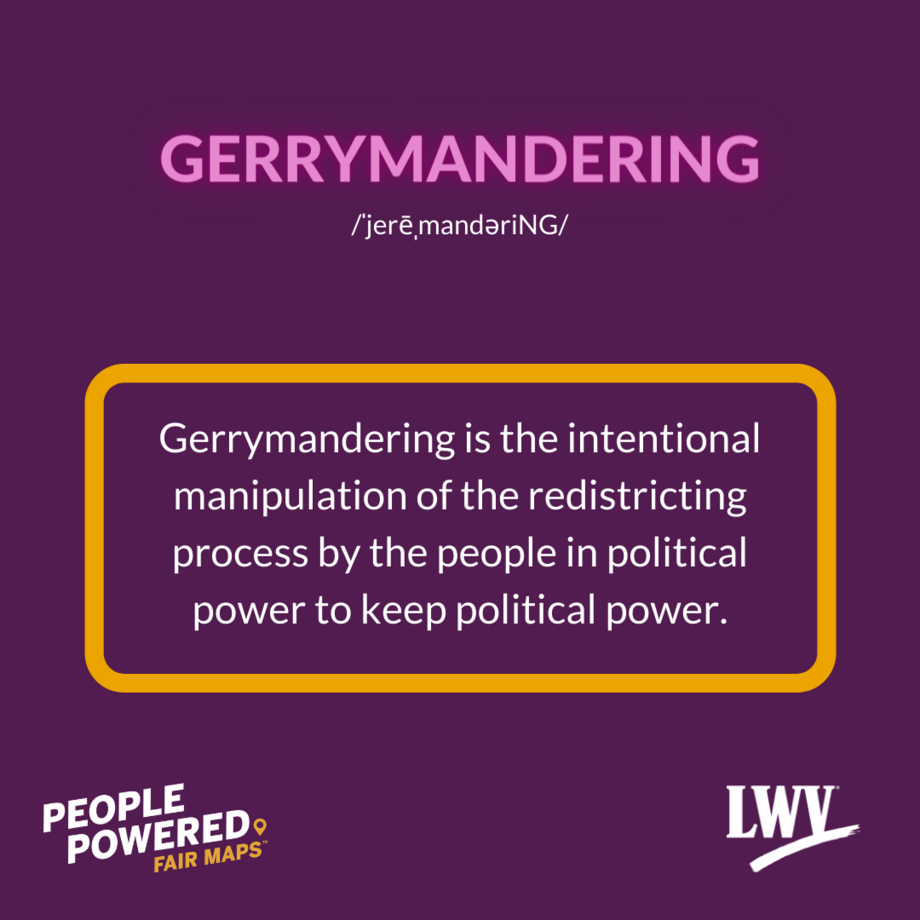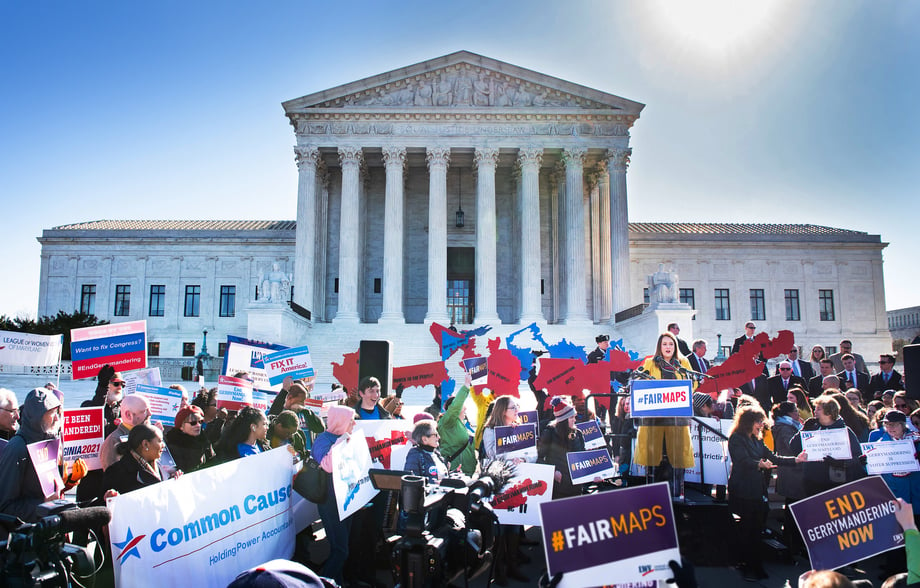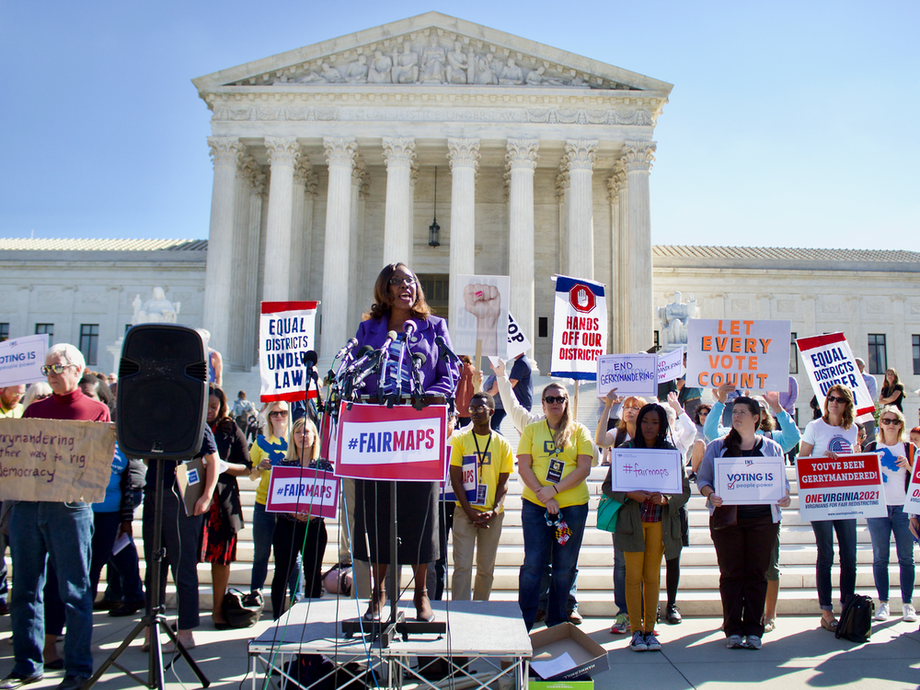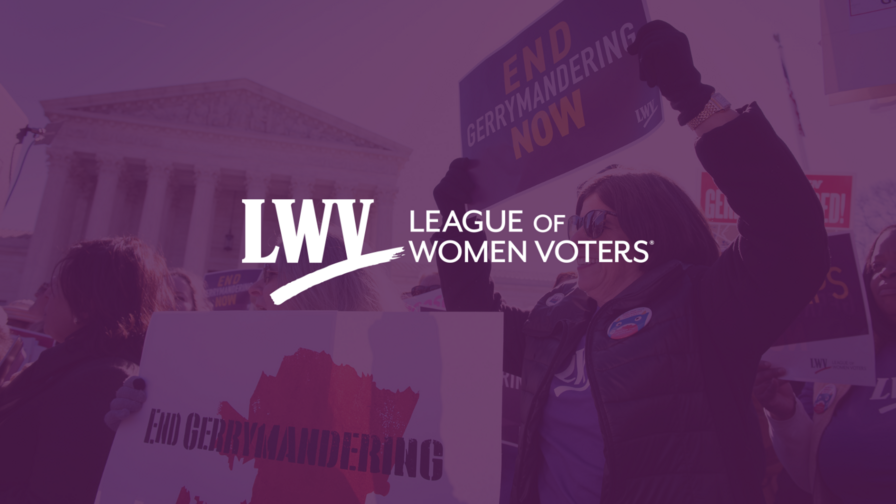A Racial Gerrymandering Case at the Supreme Court: Alexander v. SC State Conf. of the NAACP
The Supreme Court’s 2022 Term brought us redistricting wins (though the fights were a little too close for comfort in Allen v. Milligan and Moore v. Harper), a devastating blow to civil rights protections in 303 Creative v. Elenis, and the loss of critical affirmative action policies in higher education in Students for Fair Admissions v. Harvard.
The Court’s 2023 Term began on October 2, and the League is already invested in and carefully watching an important redistricting case, Alexander v. South Carolina State Conference of the NAACP. The case is an appeal from a ruling striking down South Carolina’s congressional map as an unconstitutional racial gerrymander. The Court will hear the case on October 11, 2023.
What is Racial Gerrymandering?
Supreme Court precedent requires that when drawing district maps, map drawers may only consider race if they have a compelling reason to do so. One example of a compelling reason is when states use race to comply with the Voting Rights Act of 1965 and ensure that Black voters or other voters of color have an opportunity to elect candidates of choice.

If map drawers use race as a predominant factor while redistricting but can’t show a compelling reason for doing so, the resulting districts are considered racially gerrymandered. Racial gerrymandering violates the Equal Protection Clause of the Fourteenth Amendment, which requires that states must treat people the same under their laws. It also violates the Fifteenth Amendment, which outlawed racial discrimination in voting.
In previous racial gerrymandering cases, the Supreme Court has rejected districts, often irregularly shaped, that were drawn with race as a predominant factor and did not consider traditional redistricting criteria like compactness, contiguity, and respect for political subdivisions.
For further background, see this LWV page on redistricting or this helpful explainer.
Stay Updated
Stay up to date with redistricting news and calls to action!
South Carolina’s Racially Gerrymandered Map
After the 2020 Census, states were required to redraw their congressional districts to reflect population changes. During redistricting, the League of Women Voters of South Carolina (LWVSC) proposed a congressional map that kept Charleston County and other communities of interest whole and created a competitive swing district centered around the Charleston area.
On January 26, 2022, South Carolina Governor Henry McMaster signed a new congressional map into law. Despite public testimony and support to keep Charleston County whole, the map split the county, placing the cities of Charleston and North Charleston together with South Carolina’s Midlands Region, nearly one hundred miles away, to create the Sixth Congressional District. The remainder of Charleston County was combined with other parts of South Carolina’s coast to form the First Congressional District. Of the voters in Charleston County who were moved out of the First District and into the Sixth, 62% were Black — over 30,000 Black residents.
South Carolina NAACP Files Racial Gerrymandering Suit
On February 10, 2022, the South Carolina Conference of the National Association for the Advancement of Colored People (NAACP) and an individual voter filed a complaint in federal court arguing the First Congressional District and others were racially gerrymandered in violation of the Fourteenth and Fifteenth Amendments.

In their complaint, the plaintiffs argue the legislature impermissibly used race when redrawing the map because they chose to use race over traditional redistricting criteria like keeping political subdivisions together or ensuring compact districts. The plaintiffs argued that this occurred when the legislature repeatedly divided counties and cities among multiple districts and, in several cases, moved Black voters to the Sixth District and decreased the percentages of Black voters in the surrounding First, Second, and Fifth Districts. According to the complaint, this tactic directly reduced the ability of Black voters to affect elections in the challenged districts.
On January 27, 2023, after a trial in which LWVSC testified, a three-judge district court panel ruled that the legislature had unconstitutionally racially gerrymandered South Carolina’s First Congressional District. They did so by moving over 30,000 Black residents, concentrated in North Charleston, from the district and placed them in the Sixth Congressional District, over 100 miles from North Charleston. The court ordered the legislature to submit a remedial map by March 31, 2023 and forbade any more elections using the map until the racial gerrymander was corrected.
South Carolina appealed to the United States Supreme Court, which automatically hears appeals on racial gerrymandering claims. In its appellate briefing, the state legislature argued that the new map was a partisan gerrymander, not a racial gerrymander, and that the three-judge panel erred by failing to grant the legislature a presumption of good faith, among other alleged errors.
LWVUS & LWVSC File Briefs in the Case
On August 18, 2023, LWV South Carolina and LWVUS filed separate amicus briefs, urging the Supreme Court to affirm that South Carolina’s First Congressional District is an unconstitutional racial gerrymander.
LWV South Carolina’s brief detailed that Charleston County is a community of interest given its long history of having an economy centered around the coast, its port, and its various associated industries. In redistricting, a community of interest is a neighborhood, community, or group of people with common policy concerns that would benefit from being maintained in a single district. Local community members define a community of interest.
Get involved in your community and join one of the 700+ state and local Leagues.
The brief also detailed how the enacted congressional districts artificially divided Charleston County and its main economic assets by placing tens of thousands of its Black voters into the Sixth Congressional District, over 100 miles away. It argued that this division degraded the county’s federal representation by dividing its citizens among two federal representatives and forcing them to compete with the citizens of the I-95 corridor, whose interests differed significantly.
LWVUS joined an amicus brief led by the Lawyers’ Committee for Civil and Human Rights Under Law, the Leadership Conference on Civil and Human Rights, and other voting rights organizations. Their brief argued that the legislature’s inconsistent statements on whether the districts were drawn for partisan purposes did not support reversing the panel’s ruling. It argued the Court should reject the defendant’s proposal to heighten further the standard plaintiffs must satisfy when bringing racial gerrymandering suits, thus making it more difficult to hold legislatures accountable for racial gerrymandering.
Why Alexander v. South Carolina State Conference of the NAACP Matters
The 2021 redistricting cycle was the first since the Supreme Court gutted the Voting Rights Act of 1965 (VRA) by rendering Section 5 ineffective in Shelby County, Alabama v. Holder. Based on its history of racial discrimination in voting, South Carolina was previously covered by Section 5 and, according to its requirements, had to submit redistricting plans for approval to a federal court or the Department of Justice to ensure the maps did not harm Black voters or other voters of color.

Without the protection of Section 5, voters seeking to challenge racial discrimination in redistricting must file suit in federal court, as the plaintiffs have done in this case. These lawsuits are expensive, resource-intensive, and time-consuming. Plaintiffs in racial gerrymandering cases also have the burden to prove that a racial gerrymander occurred, which is a significant legal hurdle.
To protect our democracy and the right of every voter to be heard, the Supreme Court must uphold the panel decision in this case, refuse to increase the burden on plaintiffs in racial gerrymandering cases, and order a new congressional map in South Carolina in time for the 2024 election.
Congress must also pass the John Lewis Voting Rights Advancement Act (JLVRAA) to restore the VRA to its full protections.
Check out our redistricting page for updates on congressional maps, illegal gerrymanders, and cases like this!
The Latest from the League
WASHINGTON, DC —Today, the League of Women Voters of the United States joined an amicus brief filed by the Lawyers' Committee for Civil Rights Under Law in Alexander v. South Carolina State Conference of the NAACP, a racial gerrymandering case to be heard before the Supreme Court of the United States this fall. The brief is also joined by the Leadership Conference on Civil and Human Rights, the Leadership Conference Education Fund, Asian Americans Advancing Justice | AAJC, Asian American Legal Defense and Education Fund, Campaign Legal Center, Demos, and the Southern Coalition for Social Justice.
During the 2022 Supreme Court term, the League of Women Voters filed amicus briefs in four cases: Moore v. Harper, Allen v. Milligan, Students for Fair Admissions v. Harvard, and 303 Creative, LLC v. Elenis.
We recap the case and its impact on voting rights, discrimination, and redistricting.
SCOTUS upheld in Allen v. Milligan a lower court ruling that Alabama must create a second majority Black congressional district in compliance with Section 2 of the Voting Rights Act.
Sign Up For Email
Keep up with the League. Receive emails to your inbox!
Donate to support our work
to empower voters and defend democracy.





